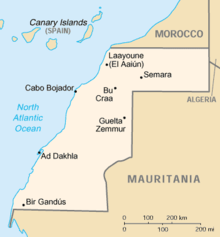- Moroccan Army of Liberation
-
Part of a series on the History of Western Sahara 
Background History of Morocco (Colonial wars)
Spanish Sahara · Spanish Morocco
Moroccan Army of Liberation
Harakat Tahrir · Sahrawi National Union Party
Madrid AccordsDisputed regions Saguia el-Hamra · Río de Oro
Southern Provinces · Free Zone ·Politics Legal status of Western Sahara · Politics of Morocco / of the SADR
Polisario Front (former members)
Royal Advisory Council for Saharan AffairsRebellions Pre-1975:
Ifni War · Zemla Intifada
post 1975:
Western Sahara War · Independence IntifadaConflict issues Refugee camps · Wall · Human rights in Western Sahara Sahara peace process Resolution 1495 · Resolution 1754 · Visiting mission · Referendum mission · ICJ Advisory Opinion · Settlement Plan · Houston Agreement · Baker Plan · Manhasset negotiations · Moroccan Initiative The Army of Liberation (French: Armée de Libération, Arabic: jayshu-t-tahrīr, Spanish: Ejército de Liberación) was a force fighting for the independence of Morocco.
In 1956, units of the Army, which started to move its staff from North Spanish Morocco, began infiltrating Ifni and other enclaves of Spanish Morocco, as well as Spanish Sahara (today Western Sahara), to claim them as part of Morocco. Initially, they received important backing from the Moroccan government. In the Spanish Sahara, the Army rallied Sahrawi tribes along the way, and triggered a large-scale rebellion. In early 1958, the Moroccan king reorganized the Army of Liberation units fighting in the Spanish Sahara as the "Saharan Liberation Army"[citation needed], also known as the Southern Liberation Army (Armée de Libération du Sud), sometimes abbreviated as ALS. The ALS had prestigious leaders such as Abderrahmane Youssoufi[citation needed], Mohamed Basri and Bensaid Aït Idder.
The revolt in the Spanish Sahara was put down in 1958 by a joint French and Spanish offensive, known as Operation Ecouvillon or Operation Ecouvillon-Teide. Upon their retreat, the guerrilla fighters were, surprisingly, hindered by the regular Moroccan Army, which allowed Spanish and French forces to neutralize them [1][2]. The King of Morocco then signed an agreement with the Spanish, where Spain returned the province of Tarfaya (until that agreement, part of Spanish Sahara) to Morocco. Part of the Army of Liberation was absorbed into the Moroccan armed forces.
Morocco sees the Army of Liberation battles in Western Sahara, and the fighting under Moroccan flag of Sahrawis as a proof of Western Sahara's loyalty to the Moroccan crown, whereas sympathizers to the Polisario Front view it only as an anti-colonial war directed against Spanish. Sahrawi veterans of the Army of Liberation today exist on both sides of the Western Sahara conflict, and both the Kingdom of Morocco and the Sahrawi Arab Democratic Republic celebrate it as part of their political history. Some parents of founder members of Polisario were members of the Army of Liberation[citation needed], most notably the father of Mohammed Abdelaziz the president of Polisario and the Sahrawi Arab Democratic Republic, who is living in Morocco and is a member of CORCAS[citation needed].
See also
References
Categories:
Wikimedia Foundation. 2010.
